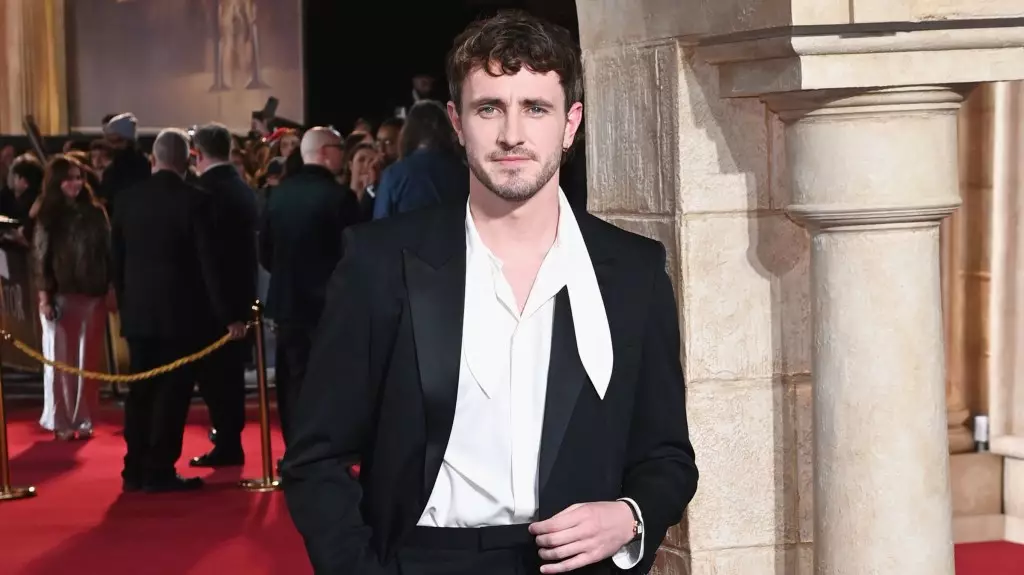In a world where social media dominates interactions, the phenomenon of parasocial relationships—where fans form emotional bonds with public figures despite a one-sided nature—has become increasingly common. Paul Mescal, the rising star of Gladiator II, recently articulated his thoughts on this strange dynamic during a candid interview on Sean Evans’ Hot Ones. Mescal had his breakthrough role in the acclaimed series Normal People, but he has become aware that, although audiences may feel a connection with him, the reality is quite different. “It’s just a weird thing because ultimately I don’t know you, you don’t know me,” he stated. His acknowledgment adds a layer of complexity to how we understand the actors on screen, highlighting the distinction between the characters they portray and their true selves.
The question arises: how do we reconcile the emotional investments made by viewers in these relationships? Mescal suggests that audience members often misinterpret the personas constructed through characters, believing they perceive the “real” actor behind the roles. This confusion can lead to unrealistic expectations and pressure, a phenomenon escalating with every public engagement. Mescal’s introspection invites a more nuanced understanding of celebrity culture, urging audiences to separate their feelings toward a character from the actual individual behind the performance.
Maintaining Authenticity in the Face of Public Scrutiny
The pressure to conform to public expectations can constrict an artist’s creative freedom. Mescal, however, is adamant about remaining authentic. He firmly stated, “I don’t care what people want me to do,” reinforcing his resolve to resist compromises in his craft. This rebellious spirit highlights a growing trend among contemporary actors—valuing creative integrity over popularity. For many artists, succumbing to public whims can mean sacrificing their genuine artistic vision. Thus, Mescal’s willingness to remain resolute serves as an example for other aspiring actors facing similar dilemmas in an industry that often prioritizes profit over the purity of self-expression.
Moreover, his reluctance to divulge personal details further reflects his commitment to maintaining a boundary between his public and private lives. The incessant speculation regarding his relationship with musician Phoebe Bridgers has drawn unwanted media attention, and Mescal has made it abundantly clear how invasive he finds such scrutiny. “It’s nobody else’s business and should never be commented on because it’s indecent,” he argued. This perspective emphasizes the crucial need for privacy amid the chaos of celebrity, a plea that resonates with many in an age where social media brews constant speculation and gossip.
Leading up to his recent cinematic endeavors, Mescal reminisced about the early stages of his career, specifically his audition process for Normal People. He candidly shared the anxiety of initial chemistry readings, worried that his journey could have halted prematurely. “I thought at that point that could be lights out for me,” he recalled. His candidness about the rollercoaster of his career encapsulates a universal truth for aspiring actors—success often hinges on serendipitous moments. This shared vulnerability fosters a connection with fans who admire not only his on-screen talents but also his willingness to share the struggles inherent in pursuing a creative profession.
The anticipation surrounding Gladiator II is palpable as it gears up for its release on November 22. Mescal’s role as the grown-up Lucius, entwined in a tale of vengeance against a faltering Roman empire, harkens back to the grand narratives that have defined epic cinema. With the involvement of a stellar cast, including icons like Denzel Washington and Pedro Pascal, this sequel embodies the evolution of Mescal’s career, transitioning him from a beloved television star to a leading figure in blockbuster cinema.
As Mescal steers his career towards new heights, his reflections serve as a powerful reminder of the importance of authenticity and personal boundaries in an industry rife with public perception. By navigating the complexities of parasocial relationships and staying true to his artistic vision, Mescal not only carves out his own path but also challenges the broader notion of celebrity. His journey invites us to reconsider our own expectations of public figures, cultivating a more empathetic understanding of the nuanced lives they lead beyond the screen.
